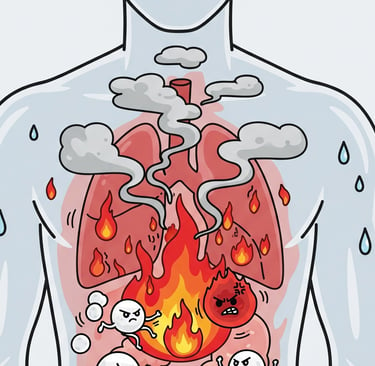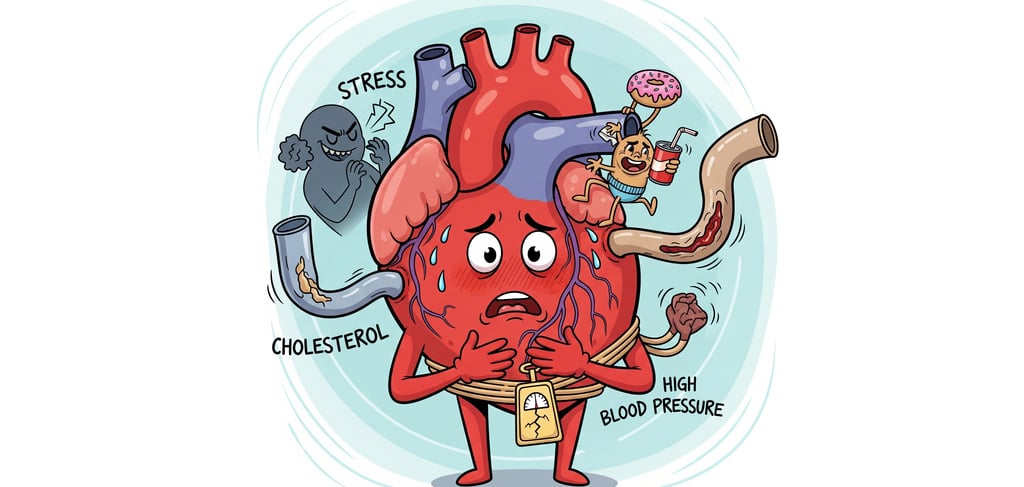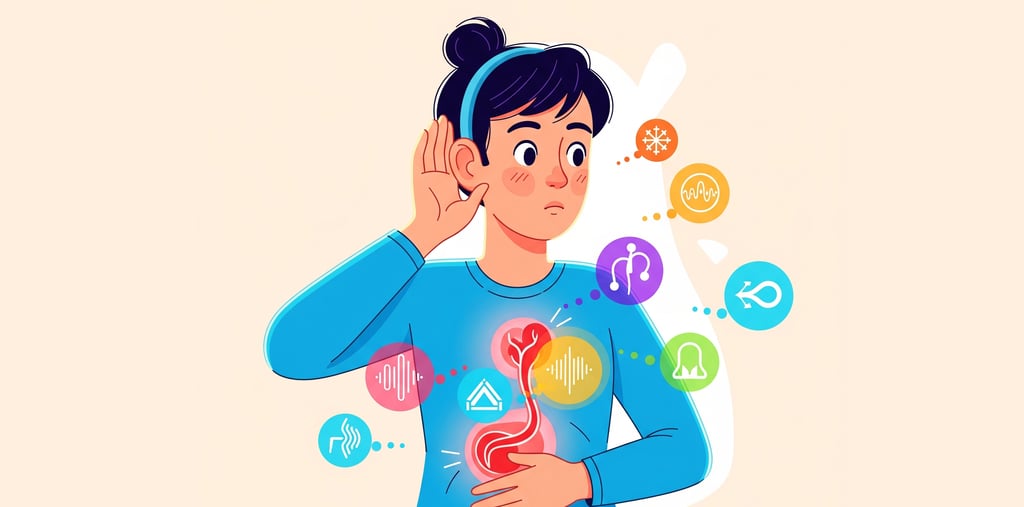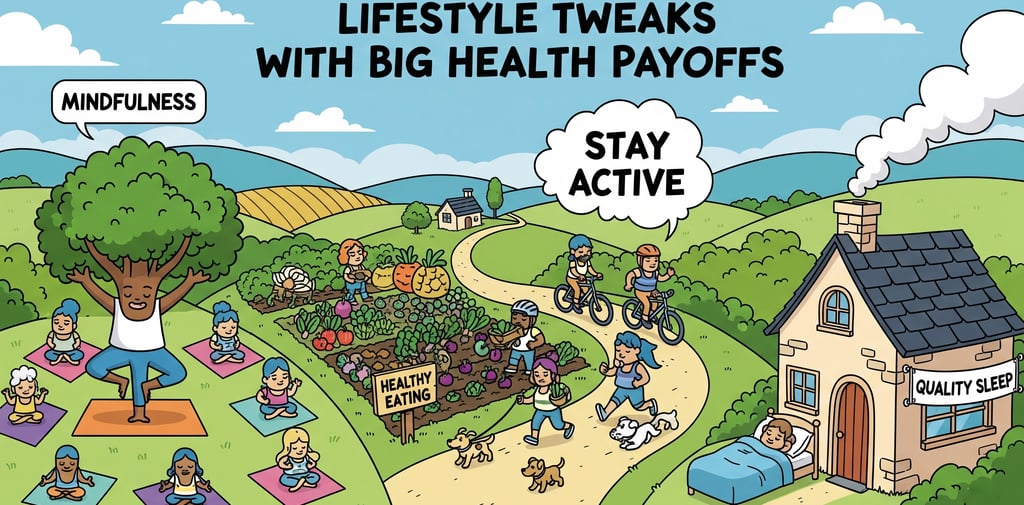Is Your Body on Fire? The Truth About Chronic Inflammation & How to Fight It
Chronic inflammation is a hidden health crisis driving fatigue, pain, and serious illness—and most people don’t even know it’s there. This guide breaks down what it is, why it matters, and the powerful lifestyle shifts—from food to sleep—that can help you fight it naturally and feel better fast.
Ron Souers
8/5/20257 min read
What if the nagging fatigue, brain fog, or random aches you’ve been ignoring aren’t ‘just me getting older’—but signs of a hidden fire smoldering inside your body?
This invisible threat is called chronic inflammation, and it’s linked to everything from heart disease to Alzheimer’s, obesity to mood disorders. Research from the Mayo Clinic suggests that chronic inflammation is the underpinnings of one of the most significant health issues facing Americans today. 1 Yet, few understand how it works or what to do about it.
Chronic inflammation is a silent disruptor affecting millions, often mistaken for aging or stress, yet understanding its root causes, warning signs, and proven natural solutions can empower you to reduce your risk of serious illness and reclaim your vitality. In this guide, we’ll unpack the science behind inflammation, how it spirals out of control, the diseases it’s connected to, and practical, research-backed lifestyle changes you can begin today to fight it naturally.
Now, let’s start with what inflammation is—and why it’s not always the bad guy.
Understanding the Healing Side of Inflammation
Inflammation can be tricky, yet it is essential for your body's survival in the right amounts.
Acute inflammation is your body’s first responder—rushing in to heal infections, cuts, or irritants fast. Limited range of motion, mild pain, or tenderness is a signal of your body’s effort to recover. According to Harvard Health, acute inflammation is only a part of a body’s defense mechanism. 4 Any swelling, warmth, or redness is a process by which the Immune System recognizes and removes harmful agents in your body.
Acute inflammation is generally temporary and sudden. The issue arises when that inflammation doesn’t know when to turn off. The Cleveland Clinic notes that left unchecked, this inflammation can quietly eat away at tissues, organs, and cells, sometimes for years before symptoms appear.
Now let’s explore how this slow-burning inflammation can cause disease.
The Hidden Link Between Inflammation and Chronic Illness
When your immune system stays switched “on,” your body becomes its own worst enemy.
The World Health Organization reports that diseases associated with chronic inflammation are the leading cause of mortality in the world. They claim that these chronic conditions are the greatest threat to humankind and are expected to increase over the next 30 years.
Here is some alarming data from a 2014 Rand Corporation study: 2
60% of Americans have at least one chronic disease
42% had two or more chronic diseases
12% of American adults have five or more chronic diseases
Research from Johns Hopkins Medicine and the National Institute of Health links chronic inflammation to: 3
Heart disease
Type 2 diabetes
Chronic Obstructive Pulmonary Disease (COPD) (the third highest cause of death)
Cancer
Depression
Obesity
For instance, visceral fat (deep belly fat) can trigger your immune system to treat those cells as threats. As Dr. Robert Shmerling of Harvard Health explains, this ongoing immune response wears down tissues over time because a person's white blood cells mistake it for a threat. 4
This state of inflammation can persist as long as the person remains overweight. These fat cells are also associated with Type 2 diabetes, where there is a high level of cytokines. Cytokines help regulate your immune system—until your body produces too many. Then, they turn destructive, accelerating aging and chronic disease. Given its prevalence, let’s explore some of the common causes of chronic inflammation.
What Causes Chronic Inflammation?
If it is so common, how does one get chronic inflammation?
While it is tricky to pinpoint even for the most skilled doctor, some experts believe that it happens when your autoimmune system goes haywire. It could be due to an ongoing infection resulting from an insufficient removal of a foreign agent that caused the original inflammation. Additionally, breathing in industrial chemicals or irritants over extended periods can be harmful, as seen with asbestos fibers found in particular construction and shipyard work. 5
People who are at higher risk of chronic inflammation are those over 50, have a diet high in saturated fats and sugars, smokers, those with extreme emotional disorders, chronic stress, or sleep disorders. For instance, when smoking or high blood pressure ruptures your arteries, your body tries to heal it, but the inflammation can go too far, damaging the artery walls and fueling deadly plaque and clots that lead to heart attacks or strokes.
So, how do you know if it’s affecting you?
Is Your Body Trying to Tell You Something?
Because chronic inflammation works in the background, it’s easy to miss—until your body starts sending these signals:
Chest or abdominal pain
Brain fog or fatigue
Joint stiffness
Sleep issues
Depression or anxiety
At this time, there are no foolproof laboratory measures to detect chronic inflammation. To make matters worse, these are only done when the inflammation occurs in association with another medical condition. That makes it harder to catch. The only way to know for sure is to talk to your doctor—they might run blood tests such as a C-reactive protein or erythrocyte sedimentation rate. 1
So what fuels this fire—and how can we put it out naturally?
What You Eat Can Hurt You—or Help You Heal
The cure isn’t in a bottle—it’s in your lifestyle. Most of the time, acute inflammation isn’t a big deal—it’s part of your body’s natural healing process. You can simply use an ice pack or take something over-the-counter for relief, but usually, it’s best to let it run its course.
However, Chronic inflammation is stealthy. Eating the right foods and supplements can make a huge difference. Here are some suggestions from The Mayo Clinic: 1
Supplement with Turmeric & Ginger.
Turmeric (especially its active compound, curcumin) is a potent anti-inflammatory shown to block NF-kB, a molecule linked to many chronic diseases. 6 Ginger has similar effects and may help reduce pain and stiffness in joints. Both can be taken as capsules, powders, or teas.
Eat the Rainbow—Daily.
Fill your plate with berries, leafy greens, beets, avocados, and whole grains. These antioxidant-rich foods help your cells heal, fight off damage, and calm inflammation.
Boost with Fermented Foods.
Yogurt, kefir, kombucha, and kimchi can lower inflammatory markers like IL-6, support gut health, and improve your immune response time. Remember to look for labels that say “live cultures” for best results.
Get Omega-3s on the Regular.
Salmon, sardines, flaxseeds, walnuts, and chia provide omega-3 fatty acids that help regulate the body’s inflammatory response, and may even reduce pain and brain fog. Omega-3s are also available as a supplement.
Cut Sugar + Processed Junk Food.
Skip sodas, pastries, and fried food. These spike blood sugar and trigger inflammatory messengers. Opt for sparkling water, unsweetened tea, or black coffee instead.
Scale Back the Red Meat.
Too much red meat can trigger inflammation. Try swapping in fish, tofu, or beans a few times a week, or choose leaner cuts (like sirloin) if going meatless isn’t your thing.
While diet is super important, let’s take a look at other ways that you can help prevent inflammation.
Lifestyle Tweaks with Big Health Payoffs
Getting better sleep: Numerous studies have shown that people who frequently get the recommended amount of sleep, which is between 7 and 9 hours, tend to have less chronic inflammation. For recommended ways to get better sleep, check out my blog called Screens Are Wrecking Your Sleep.
Exercise regularly: It doesn’t take hours at the gym either—just 20 minutes of walking throughout the day can have a real anti-inflammatory impact.
Stress reduction: To protect you, the immune system sends out cytokines when you are under stress. Engaging in stress-reducing activities like yoga, mindfulness, or meditation can have a profoundly positive effect, much like pouring cold water on your nervous system. It doesn’t take hours; just 10 minutes a day can make a huge difference.
Quit smoking: Vapes, nicotine, and cigarettes can trigger inflammation and throw your immune system out of whack. 1
All of this leads us to one powerful realization.
You don’t have to live in the fog of fatigue, pain, or confusion. You can extinguish this silent fire with every smart step you take.
So chart your course, choose your next move, and set sail toward a healthier, happier future.
Start by choosing one thing from this list today—and give your body the healing it’s been waiting for.






Mayo Clinic Press Editors. “Chronic Inflammation: What It Is, Why It’s Bad, and How You Can Reduce It.” Mayo Clinic, 3 Jan. 2024, mcpress.mayoclinic.org/dairy‑health/chronic‑inflammation‑what‑it‑is‑why‑it’s‑bad‑and‑how‑you‑can‑reduce‑it/.
Johns Hopkins Medicine. “A Woman’s Journey: Inflammation in the Body.” Johns Hopkins Medicine, Johns Hopkins University, 2025, www.hopkinsmedicine.org/health/health-on-demand-seminars-list/a-womans-journey-inflammation-in-the-body. Accessed 5 Aug. 2025.
Pahwa, Roma, Amandeep Goyal, and Ishwarlal Jialal. “Chronic Inflammation.” StatPearls, StatPearls Publishing, 7 Aug. 2023, National Center for Biotechnology Information, U.S. National Library of Medicine, https://www.ncbi.nlm.nih.gov/books/NBK493173/. Accessed 5 Aug. 2025.
Komaroff, Anthony L., M.D. “Understanding Acute and Chronic Inflammation.” Harvard Health Publishing, 1 Apr. 2020, www.health.harvard.edu/staying-healthy/understanding-acute-and-chronic-inflammation.
U.S. Department of Veterans Affairs. Asbestos. VA Public Health, 21 Apr. 2025, https://www.publichealth.va.gov/exposures/asbestos/#:~:text=Exposure%20to%20asbestos%20can%20be. Accessed 5 Aug. 2025.
Spritzler, Franziska. “10 Supplements That Fight Inflammation.” Healthline, medically reviewed by Jared Meacham, PhD, RD, CSCS, updated 16 Jan. 2024, https://www.healthline.com/nutrition/anti-inflammatory-supplements. Accessed 6 Aug. 2025. healthline.com+10healthline.com+10en.wikipedia.org+10


Support
A guide for neurodivergent workplace challenges.
Resources
Community
RonSouers@dadhdwss.com
© 2025. All rights reserved.
